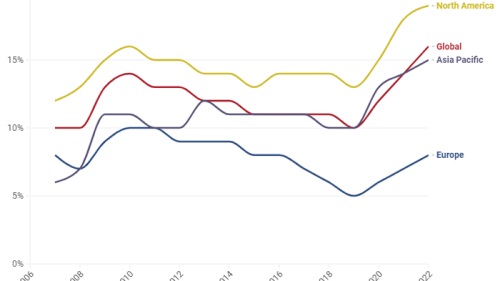At the recent ULI Europe Conference in London, Michael Gove, the current Secretary of State for Environment, Food and Rural Affairs for the U.K., and Lord Adair Turner, chair of both the Energy Transitions Commission and the Institute for New Economic Thinking, discussed how inclusive and sustainable economic growth can be achieved while also addressing issues of climate change and wage inequality.
“Productivity in the last 20 to 25 years has probably gone down,” Gove said. “We have an incredibly service-orientated economy, but a lot of organizations reach a certain size but then take money out rather than invest in technology or their people.” Water companies, he added, are a case in point.
The situation in the United Kingdom, said Gove, is such that people are increasingly questioning the current capitalist model. “For capitalism to work, people have to believe that society is meritocratic,” he said. “If people are smart and have connections, they can do very well indeed. If not, they fall further behind. People no longer think that this is a meritocracy.”
The result, said Gove, is that capitalism is being rethought. “In terms of human capital, we need to think about people as assets rather than units of production,” he said. “Businesses worry when politicians criticize capitalism, but we need to be honest about the need for reform. We need action to take on the digital capitalists of our time, which have near-monopolistic power. We need to make sure that some of their practices don’t turn people against capitalism.”
Gove urged that changes are required on multiple fronts, not least reforms to taxation to encourage companies to reinvest profits in technology and human capital, improvements to infrastructure and the educational system, and investment in science. “People talk about America’s success being built on freewheeling capitalism, but it also comes from investment in science and technology,” he said. “We have a good science base in this country, but we can do more.”
Lord Turner, former director general of the Confederation of British Industry, focused his address on how to counter climate change. “It is obvious to some people that we don’t need to talk about climate change,” he said. “Some people claim it’s not occurring and point to the freezing weather in Chicago. Well, people in Australia might have a different view.”
Climate, rather than weather, Turner continued, is complex. “It is likely that the drift towards climate change can be combined with blasts of cold air,” he said. “It’s not certain, but what is certain is that a climate that is on average warmer is more volatile. The objective of the Paris Agreement to limit the global temperature rise to two degrees is well founded. Every half a degree has an accelerating impact.”
However, Turner pointed out that the technology exists to hit the Paris objectives with limited impact on countries’ economies. Some developing countries, particularly in Africa, he added, still need to use more energy per capita if they are to achieve economic growth, but that must be done in a sustainable way.
Critical to achieving carbon reductions, said Turner, is electrification. “The future is electric, and electricity generation can be made green,” he said. “There may be some nuclear, but most of the energy needed in the future can be generated from renewable sources. The cost of solar panels, for instance, is 10 percent of what it was 10 years ago.”
Turner said that there have been issues with renewables in terms of what happens when the sun doesn’t shine to power solar panels or when the wind fails to turn wind turbines, but he added that advances in battery technologies were already tackling the problem. “Batteries are 80 percent cheaper than they were in 2010, and the expectation is that they will halve again by 2025,” he said. “At the commission, we are convinced that wind and solar can provide 85 percent of energy need—and that it will be cheaper to do so than with fossil fuels.”
Gove—a prominent Brexit supporter—joked, “It is wonderful to be surrounded by people who know what they’re talking about,” he said, before going on to note that the United Kingdom is currently living through “one of the most uncertain times in politics.” Some in the opposition Labour Party want a negotiated “soft Brexit,” he said, while others want a second referendum and potentially no Brexit at all.
His colleagues on the Conservative benches, he added, either support the deal negotiated by Prime Minister Theresa May, a no-deal scenario, or another referendum. “There are strange alliances both within parties and across parties,” said Gove. “You have to go back to 19th or even 18th century to find a comparable situation.”
Asked about morale around the cabinet table, Gove said that it changed on a daily basis, if not more frequently. “Morale fluctuates,” he said. “The government suffered a huge defeat in the House of Commons [with the vote against May’s deal in January], but the very next day the prime minister won a vote of confidence. The media cycle is now a 24-hour operation, and the velocity can be disorientating.”




